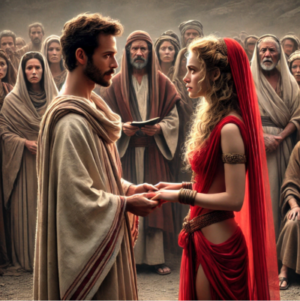 Today’s Trundle comes from Days 201/202 in the Bible Recap.
Today’s Trundle comes from Days 201/202 in the Bible Recap.
Hosea lived during a time of profound moral and spiritual decline in Israel. No surprise here—the nation, divided into Israel and Judah, was steeped in idolatry, political instability, and social injustice. Samaria had fertile land, and major trade routes passed through it, adding to their sense of security. Worship of Baal and other false gods was rampant. God’s covenant was far from their minds. And hearts.
Hosea’s message served as a wake-up call and a powerful reminder of God’s relentless love, offering hope even in the nation’s darkest rebellion. Despite their economic prosperity, the people had turned from God. They trusted in political deals and wealth instead of His care. Hosea warned of judgment but called them to repentance, reminding Israel that God’s love never failed, even when they strayed.
Hosea 3:1 (CSB):
“The Lord said to me, ‘Go again; show love to a woman who is loved by another man and is an adulteress, just as the Lord loves the Israelites though they turn to other gods and love raisin cakes.'”
Love Story Like No Other
Once upon a time in ancient Israel, God decided to teach His people a lesson about love, faithfulness, and forgiveness. Naturally, this required an unorthodox method: He told the prophet Hosea to marry Gomer, a well-known prostitute. That sounds like a pretty big ask from God. Or was it?
“Excuse me, Lord,” Hosea probably said, “you want me to marry… who?”
“Gomer,” God replied, completely serious. “Because my people are acting like her, and I want them to see what love looks like.”
So Hosea, being the obedient prophet he was, proposed to Gomer—probably the strangest proposal she’d ever received.
“Wait,” she might’ve said, “you’re a prophet. Are you sure about this?“
“Yup. Positive,“ Hosea sighed. “God insists.”
The wedding must have been the talk of the town. People whispered, “Isn’t that Gomer? And Hosea? What is going on?“
Hosea probably shrugged and said, “It’s a metaphor. You’ll understand later.”
But it didn’t stop there. Gomer kept running off, and Hosea kept bringing her back, demonstrating God’s relentless love for His wayward people each time. Imagine Hosea chasing Gomer through the market, muttering, “This is not what I signed up for,“ while God whispered, “Love her as I love Israel—no matter how many times she strays.”
Ultimately, Hosea’s messy marriage became one of the Bible’s greatest love stories. Because, let’s face it if God can love a wayward people like Israel—and make Hosea love Gomer—He can love us, no matter how far we stray.
Moral of the story: When God says, “Trust Me,“ buckle up—it’s going to be a wild ride.
Romans 5:8 (CSB):
“But God proves his own love for us in that while we were still sinners, Christ died for us.”
C.S. Lewis:
“Though our feelings come and go, His love for us does not. It is not wearied by our sins, or our indifference; and, therefore, it is quite relentless in its determination that we shall be cured of those sins, at whatever cost to us, and at whatever cost to Him.” (Mere Christianity)